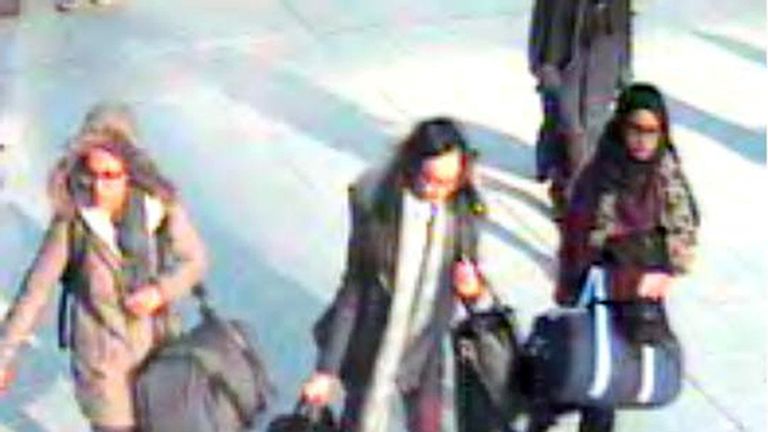IS bride Shamima Begum loses first stage of legal fight over her citizenship
Begum was one of three east London schoolgirls who travelled to Syria in 2015 to join Islamic State.
Friday 7 February 2020 15:42, UK
IS bride Shamima Begum has lost the first stage of a legal challenge against the decision to revoke her British citizenship.
She was one of three east London schoolgirls who travelled to Syria to join Islamic State in 2015.
Begum, who is now 20, lived under Islamic State rule for more than three years before being discovered nine months pregnant in a Syrian refugee camp last February.
Then-home secretary Sajid Javid stripped her of her British citizenship later that month.
Begum is currently in a Syrian camp and wants to be allowed back in Britain for therapy after all three of her children died.
Her lawyers argue the move to revoke her citizenship is unlawful because it has left her stateless.
Stripping someone of their citizenship is deemed lawful only if the individual is entitled to citizenship of another country.
Begum launched legal action against the Home Office at the High Court and the Special Immigration Appeals Commission (SAC).
The latter is a specialist tribunal that hears challenges to decisions to remove someone's British citizenship on the grounds of national security.
The tribunal, led by SIAC president Mrs Justice Elisabeth Laing, ruled on Friday that the revocation did not leave Ms Begum stateless.
Announcing the tribunal's decision, judge Doron Blum said the move did not breach the Home Office's "extraterritorial human rights policy by exposing Begum to a real risk of death or inhuman or degrading treatment".
While she "cannot have an effective appeal in her current circumstances", it "does not follow that her appeal succeeds" on that ground, he added.
Begum's barrister, Tom Hickman QC, had argued that Begum - who is of British-Bangladeshi heritage - "is not considered a national of Bangladesh and was therefore rendered stateless by the deprivation decision".
But the tribunal ruled that she was a "citizen of Bangladesh by descent" at the time she was stripped of her citizenship and so was not stateless.
Mr Hickman also said the move "had the effect - and was designed - to prevent" Begum from coming back to the UK, meaning she was "abandoned" in a detention camp.
This means she "cannot have a fair and effective appeal" because she is not able to speak confidentially with her lawyers or give evidence in support of her case, he added.
The tribunal did accept that "in her current circumstances, the appellant cannot play any meaningful part in her appeal and that, to that extent, the appeal will not be fair and effective".
But it added: "We cannot accept, without investigation, the assumption, apparently made by the appellant's representatives, that if she cannot have a fair and effective appeal her appeal must succeed."
Begum's lawyers also argued that the "wretched and squalid" conditions in al-Roj - and in the al-Hawl camp from which she was moved for her own safety - breached her human rights.
It was ruled that the conditions at the camp "would breach the appellant's rights under Article 3" of the European Convention on Human Rights, which protects the right to freedom from inhuman or degrading treatment.
But the tribunal said the decision did not breach the Home Office's policy on the extraterritorial application of human rights.
It said: "The appellant was in that situation as a result of her own choices, and of the actions of others, but not because of anything the secretary of state had done."
Reacting to the ECHR element of the ruling, Maya Foa, director of human rights NGO Reprieve, said: "The court today found that the detention conditions of British nationals in North East Syria constitute torture or cruel, inhuman and degrading treatment.
"It is rank hypocrisy for the government to abandon British families to torture, which it professes to categorically oppose.
"The only just solution is for the government to repatriate British families, and to try people in British courts if they have charges to answer."
Begum and two other pupils from Bethnal Green Academy - Kadiza Sultana and Amira Abase - boarded a flight at Gatwick and flew to Istanbul in Turkey.
They later made their way to Raqqa in Syria.
Begum married a Dutch IS fighter, Yago Riedijk, three weeks after arriving in the country.
Sky News tracked her down in February 2019.
Begum told Sky correspondent John Sparks that she was "just a housewife" during her four years in IS-held territory and "a lot of people should have sympathy" for her.








